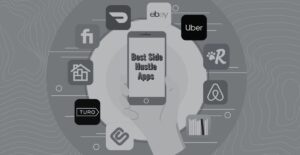Want to know how to start a blog and make money online? Where do you even start? What kind of material should you publish? When will the income start flowing in?
If you want to transform your writing into a job, you must first establish your blog, attract an audience, and secure your initial cash streams.
How to start a blog may be a gratifying and profitable endeavor that opens up new doors. You may establish yourself as a reputable authority in your subject, make a part-time or full-time income, and interact with people who share your interests and hobbies by blogging.
One common myth about how to start a blog is that you must be a great writer to be successful. People read blogs to obtain a personal viewpoint on topics, thus most bloggers write in a fairly informal and conversational way.
Because of the structure, many successful bloggers will write about a range of topics on the same site. You do not need to be a professional on any topic you write about to have a great blog.
Visitors to a culinary blog, for example, do not want to read a textbook from a food scientist; instead, they want to hear about the experiences of someone who has really made some real meals, faults, and all.
“To become a great blogger you need to have passion for your topic and an interest in writing.”
Blog writing enables you to share your experiences with others. Blogging about topics that you are passionate about makes the process of beginning a successful blog much easier.
As long as you write about topics that you are interested in, your enthusiasm will come through and keep your visitors intrigued.
No matter how many levels of experience you have, we’ll show you how to start a blog and make money online in this article.
Table of Contents
What is a Blog?
Let’s first understand what a BLOG is.
Blogging was akin to journaling in the earlier days of the internet. Some of the first blogs were used to document someone’s personal thoughts and experiences.
Blogging has since evolved into much more than a digital diary. Blogs are now used by both businesses and individuals to share information and generate sales or commissions.
Bloggers frequently write from a personal standpoint, allowing them to connect with their audience directly.
Furthermore, most blogs have a comments section where readers may interact with the author. Engaging with your readers in the comments area strengthens the bond between the blogger and the reader.
One of the most significant advantages of blogging is the direct connection with the reader. Blogging enables you to communicate and exchange ideas with others who share your interests. It also allows you to win your readers’ confidence.
Having your readers’ trust and loyalty opens the door to making money from your blog, which I will discuss further in my How to Start a Blog article.
Do you know that the internet is currently experiencing rapid expansion?
Now many people are present on the internet. This surge in growth implies that your blog will have more prospective viewers. In short, there is no better moment than the present to start a blog.
Why Should You Start Blogging?
Before thinking about how to start a blog, let us understand why you should start blogging. Starting your own blog can be done for a number of reasons.
You might want to create a blog to try out a fun hobby, make some extra money, foster community, or for any of the reasons listed below:

- To record your experience – The term blog is a short version of the word weblog, a holdover from its days as a means of keeping track of events. It is a great way to start your own blog so that you can share your thoughts and experiences with others.
- To enjoy a creative space – Writing, editing, and to some extent, design is all included in blogging. It is therefore a very creative endeavor. Blogging is a fantastic alternative if you’re searching for a relatively inexpensive way to express yourself.
- To exchange ideas and experiences – You have thoughts and experiences that are entirely unique to you since no one else is you. A blog provides a forum for connecting with others, exchanging ideas, and creating sincere relationships.
- To interact with others – Blogging interactions are a fantastic way to connect with readers, other bloggers, and content producers. Connecting with people you might not otherwise have met is made possible via blogging. The bloggers are quite active on websites like Facebook and Instagram.
- To improve one’s writing and digital marketing skills – Blogging requires skill. Your writing abilities might be enhanced by regularly updating a blog. A blog also needs a lot of behind-the-scenes work to keep it running. Together with creating content, bloggers frequently work as their own webmasters and social media marketers. Starting your own blog will provide you the opportunity to earn important experience if you wish to develop your talents in those areas.
- To Establish Your Credibility and Brand – You may develop your brand and position yourself as a respectable authority in your business or niche by starting a blog. How knowledgeable or experienced you are on a subject can be shown in your blog posts.
- To generate income or sales – Whether it’s for a brand new business or a current one, blogging can be used to generate revenue.
How to Start a Blog in Simple Steps:
If you have prepared yourself for blogging but still don’t know how to start a blog, then these simple and easy steps mentioned below will help you in your blogging journey:
● Choose the right topic or niche
When we talk about how to start a blog, the first thing that comes to mind is which topic or niche to choose. Finding a topic can be challenging or feel constricted, but over time, it will help you establish more credibility.
You can cover a variety of topics in a single article, but you should always make sure that your main point is compelling and clear enough to keep readers’ attention and encourage them to read the rest of the blog.
It’s crucial to focus your own website on topics about which you have knowledge and passion when you first launch it.
This will keep you inspired to publish fresh content frequently, which is crucial for the success of your blog. Moreover, you’ll have a higher chance of generating interesting, genuinely helpful content that readers will want to share with others on social media.
Writing about topics in which you have developed expertise raises your authority and trustworthiness, which can aid in audience growth as well as better search engine results positioning.
● Always do Competitive Research
Thinking about how to start a blog, but have you done competitive research?
Do some preliminary research to identify the other key players in your space after deciding what you want to write about. Is your sector already comparatively crowded? Or does your intended topic not attract many writers?
Whatever the situation, doing your research beforehand will enable you to comprehend how you can produce content that is superior to or distinctive from what is already available.
● Identify your audience
You should think about your audience in addition to defining your niche. Who will you be writing blogs for?
Knowing the answer to this question will allow you to generate informative and interesting articles for your audience. Before you start writing, try to ascertain the following details about your ideal reader:
What is their age?
Who lives there?
What kind of work do they do?
What other media are they currently accessing?
Do they read other blogs as well?
What problems or issues do they frequently encounter?
What do they wish they had more knowledge about?
Create your first Blog post plan
Planning your first blog article can begin once you’ve determined your niche and target market. Once more, you may need to do some research to make sure you’re writing something that your audience will find interesting.
Type your desired topic idea into a search engine to see what kinds of articles come up in the results as a starting point. It’s a great sign that you’ll be able to write something better if you discover that the existing results don’t adequately or accurately explain the topic.
● Choose a Blog name
Each blog requires a name. Make sure that the name of your blog makes sense in light of your brand or niche, is catchy and memorable, and is simple and quick to type.
If you have a name in mind, make sure no one else is already using it by searching the internet and social media.
If the name you want is already acquired, you can either make a new one or get in touch with the website owner to ask if they’re still using the name. Even your company name can be trademarked if you really want to safeguard your assets.
● Choose a Platform to host your Blog
WordPress is by far the most popular blogging platform, there are others that may be used, such as Tumblr, Blogger.com, and even Medium. If you’re serious about blogging, you should probably go for a self-hosted WordPress installation on a custom domain.
While you could create a blog at WordPress.com with a subdomain like myblog.wordpress.com, you’ll get greater traction with a self-hosted solution and then be able to leverage subdomains on popular platforms for content marketing.
● Select a Domain name
After deciding on a name for your blog, you’re ready to choose a domain name. You may determine if a domain is accessible by putting your chosen domain name into your browser and seeing if a live website displays.
Most domain registrars will also provide a tool to assist you to locate accessible domains. When you’ve found an available domain, you’ll need to pay for the rights to use it through a domain registrar.
Owning and setting up a domain is a different procedure from picking a hosting site and web builder, which you’ll accomplish next.
● Choose a reputable web hosting company
There are plenty of decent hosting companies available. There are nearly limitless choices for launching a self-hosted WordPress blog.
The main thing is to do your homework and choose the best one for your budget, as well as to confirm that the service level and uptime guarantee are present.
You should probably start with either a Managed WordPress solution or a Virtual Private Server (VPS) and scale from there. After you reach a few thousand visits per day, you’ll probably require a dedicated-hosting option with a CDN (see below).
● Networks for caching and content delivery (CDNs)
To guarantee that your webpages are sent as quickly as possible, use a solution like W3 Total Cache or WP Super Cache and enable browser caching. This may not appear to be as significant at first.
But, when you expand and your traffic grows to thousands of visitors every day, this will become crucial. To test things before and after installation, use Google’s Page Speed Insights.
It’s also critical to set up a CDN, which will accelerate the global distribution of your material. For example, while your page may load swiftly in the United States, what happens when someone in Australia wants to access your content?
CDNs duplicate data across several repositories throughout the world, allowing for ultra-fast content delivery.
This is vital for the user experience since most people would quit a website and go on to the next one in the search results if they have to wait even a few seconds for it to load. W3 Total Cache interfaces with Amazon’s AWS and MaxCDN, two excellent CDN choices.
● Activate Permalinks
Before you begin, activate Permalinks in WordPress, which will provide you with great canonical URLs that are SEO-friendly. Permalinks may be found in your WordPress admin by going to settings > permalinks and selecting the post name option.
● Download and install the AMP plugin
The Accelerated Mobile Pages (AMP) Project is a Google attempt to improve mobile accessibility to a substantial portion of their material.
The AMP protocol, which you can learn more about here, helps to slim down a webpage to its fundamental structural components, resulting in lightning-fast page speeds with scaled-back JavaScript and minified CSS code.
● Google Analytics should be installed
Install Google Analytics to keep track of your progress as you build up your blog.
This is a terrific method to keep track of your results while utilizing the URL campaign builder to drop links in social media and other locations, allowing you to efficiently establish where your traffic is coming from.
● Install Google’s webmaster tools
Anyone who is serious about starting a blog and thinking about how to start a blog and make money online should use Google’s webmaster tools to determine what keywords they are ranking for and any messages that may affect their ability to rank.
You’ll also be able to upload an XML sitemap and measure keyword impressions and click-through rates. This is one of the most essential tools for building your website or blog by continuously analyzing your efforts.
● Learn to do SEO
Although you should really not start a blog with the purpose of optimizing it to oblivion, you most certainly should learn the fundamental concepts of search engine optimization so that you pay attention to the important variables that will affect your ability to rank on search engines like Google.
Begin by reviewing and implementing Google’s Webmaster Guidelines. Learning SEO takes time and effort. You should continually be learning new things and growing your skill set.
● Provide useful content on a regular basis
If you want to be successful with your blog, you must create meaningful anchor material. It must be interesting, keyword-focused, insightful, one-of-a-kind, and well-written. Do not create material for search engines.
Rather, write for humans while also catering to search engines and what they want. Simply said, it is a skill that grows with time and practice. It’s also crucial to routinely post your material on a weekly basis.
● Join an email marketing platform
Simply said, email marketing is the greatest way to make money from your blog. This is without a doubt one of the easiest and safest ways to generate money from your site.
But first, you must join an email marketing platform such as Aweber, ConvertKit, MailChimp, Constant Contact, InfusionSoft, or any of the many others available.
● Create a lead magnet
Instead of putting advertising on your site or engaging in affiliate marketing, if you’re serious about marketing anything online, you should design a relevant lead magnet that will sell a digital product or offer that you produce in the backend.
The lead magnet will persuade folks to join your mailing list and give you their email address.
● Create a digital product and market it
Email marketing and lead magnets are all intended to assist you in developing an automated sales machine. To do so, you’ll need a digital product, service, or another type of offer on the back end.
You can develop a number of deals or goods that will bring consumers up a value chain to your high-ticket sales.
● Make a sales funnel
Spend some time developing your automated sales funnel.
There are many aspects to sales funnels, but the fundamental idea is that visitors to your site will find you through your content, enter your sales funnel through an offer provided by your lead magnet or another tripwire, and then be guided along a journey with drip-fed messages at predetermined intervals, allowing you to sell your goods and services on autopilot.
● Connect with others online
Creating a blog takes time. You must become sociable in order to succeed.
Not just through connecting with other like-minded bloggers engaged in online marketing, but also by sharing and engaging with others on social networks such as Facebook, Instagram, and other social media platforms.
● Promote your content
Content marketing is the single most crucial technique for growing a blog and increasing your exposure on search engines like Google, and it’s my go-to strategy for rocketing up the search ranks on Google’s SERPs.
Marketing your content is a complex process that requires lengthy, apparently endless hours of creating additional helpful off-site material that connects to your key anchor content, but it is definitely worth it.
If done correctly, you can utilize this one method to rank first on Google for practically any phrase. There is undoubtedly an art to this, as well as a technical framework and proper execution. In order to sell your content, do not try to spam or overstuff keywords.
Content marketing may be done through articles on sites like Medium.com or Scribd.com, answering questions on Reddit or Quora, and movies on YouTube or Vimeo, among other things.
The objective is that all of the information must be valuable, period. Don’t strive to perform the least amount of labor for the biggest result.
How to Make Money Online with a Blog
Now that you know how to start a blog, the next thing that you might be thinking about is how to make money online with a blog. Bloggers may earn money through a variety of methods. Some are more difficult to achieve than others.

Most blog revenue streams are fragile, relying on factors such as search engine algorithms and marketing expenditures. As a result, it is strongly advised that you diversify your revenue by employing several sources.
1. Collaborate with brands
Bloggers regularly link up with companies to provide sponsored content. This generally requires writing a product review or including a product reference in your normal articles.
Brand collaborations may be one-time transactions or long-term ties dependent on the performance of your content and mutual interest.
2. Choose a network for advertising
Advertising networks will pay you to put advertisements on your blog or when someone clicks on an advertisement or both.
Several networks, such as Mediavine, demand a significant number of monthly views in order to show advertising, whilst others, such as Google AdSense, have no such criteria.
3. Choose Affiliate coupons or links
Blogs can become members of affiliate networks. Affiliate networks enable you to create unique links to items that you discuss on your blog in order to earn a reward when someone purchases them. LTK and Amazon Affiliates are two common examples.
Affiliate codes function similarly to links in that you receive a small commission when someone purchases anything.
Companies may provide you with a unique code for your readers to enter at checkout when shopping online, which you may promote throughout your content to increase sales.
4. Through Digital Goods
Digital products may be a better option if you want to offer products without the logistical headache of arranging packing and delivery.
Digital products are a low-effort, low-cost solution to develop things that your target market wants to acquire. Your clients may access or download the majority of digital items instantly after purchasing them.
Digital things that you can sell include, but are not limited to:
- Printables – calendars, lesson plans, and budgeting sheets.
- Online courses – With a platform like Teachable, you may produce more extensive lessons or tutorials than your blog gives.
- E-books – Generally self-written, self-published titles that are available in PDF format.
5. Physical Goods
Your blog may also be utilized to sell actual items, whether you currently do so through another channel or wish to start from scratch.
You may include links to any current things you sell in your blog articles, or you can design your own merchandise that is relevant to your content and readership. If you are running a fashion blog, for example, you may offer T-shirts, caps, or tote bags with your site’s logo on them.
6. Through Memberships or Premium Content
Although exclusive content can be placed behind a paywall to generate additional revenue, blogs are generally free to read. Then, devoted readers or fans will have to pay to read it.
Two examples of platforms that assist creators in hosting content only available to subscribers are Patreon and Buy Me a Coffee. These platforms can be used to build subscription services where readers pay a recurring monthly fee to access premium content.
FAQs:
How is a blog different from a website?
A blog can cover a complete website, but a website is not always a blog. A blog is a website or a component of a website that writes content. A website might be a blog, a commercial, or an informative resource.
How to get maximum traffic on a blog?
You may attract visitors to your blog through a variety of methods, but search engines are often regarded as the most successful. To make your blog search engine friendly, optimize your content with appropriate headers, internal links, and meta descriptions. Several blogging systems, including WordPress, incorporate SEO tools to aid in this process.
What should be the length of a blog post?
Your blogs don’t have to have a certain length. To offer your article the greatest opportunity at ranking well in search results for that subject, you might need to aim for a set length if you’re attempting to optimize your blog post for a particular keyword. To obtain a notion of what to shoot for, compare your content to that of your rivals.
What should be the frequency of posting a blog post?
The only absolute requirement for how frequently you must publish blogs on your website is that your publishing schedule is reliable. Try to maintain your first blogging schedule of one post every day. Your timetable should be as frequent as every two to three days for your blog posts. The secret to attracting and keeping an audience is consistency, even if you just update a blog once a week or once every ten days. You will lose readers if they come to expect fresh postings from you and you don’t have any for several days or even weeks. This will have an impact on your bottom line if you use your blog to make money.
How can I feel more comfortable with blogging?
You should constantly be aware that you’re not the only one who struggles to feel confident when you write a blog when you blog. It’s okay to feel nervous or uncomfortable while putting oneself out there. Yet with time, you start to feel better the more you blog.
What safety precautions should a blog posted online take?
Owning a secure, one-of-a-kind password that is known only to you and people you can trust is the most vital measure you can take to protect your blogging website. Also, it’s advisable to regularly update the password. Also, you want your website to be regularly backed up; your web server should handle this. Choose a service that secures your personal information by employing domain privacy protection. Using a post office box rather than using your home address for mailing and getting an online phone number rather than using your actual one are two more ways to secure your personal data.
Conclusion:
Creating a blog may be an instructive, entertaining, and profitable way to communicate with people. Managing a blog entails wearing several hats, but if you’re willing to learn and grow via an ever-changing medium, you’ll likely find joy and success.
A successful blog may give you a full-time income if you have the correct tools and methods. Choose a topic about which you are both enthusiastic and informed.
This will boost your reputation with audiences and improve your search engine ranking. Purchase a domain name. Search for a domain registrar that is ICANN-accredited. Choose a web hosting company.
Examine the server’s uptime statistics, response times, convenience of use, and availability of customer assistance. Choose a blogging platform. The most popular services provide both free and paid alternatives.
Make your blog public. Consider what potential readers are looking for and why, the goal of your blog, and what competing blogs have previously written about.
Displaying advertising, joining affiliate programs, creating newsletters and subscription plans, making and selling your own items, and obtaining content sponsorships are all common ways to generate money from a website.
Related Reading:







